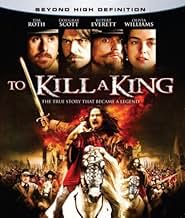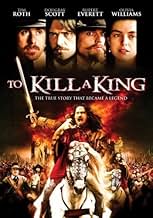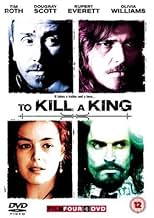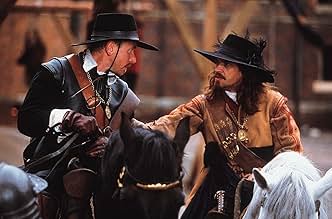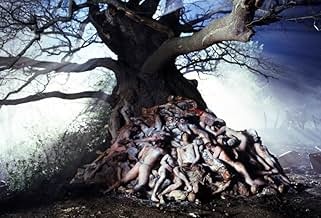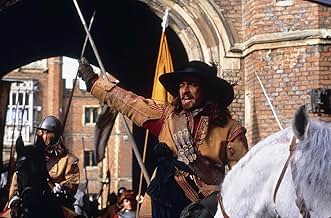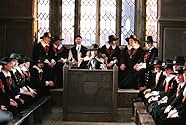VALUTAZIONE IMDb
6,2/10
3518
LA TUA VALUTAZIONE
Aggiungi una trama nella tua linguaA recounting of the relationship between General Fairfax and Oliver Cromwell, as they try to cope with the consequences of deposing King Charles I.A recounting of the relationship between General Fairfax and Oliver Cromwell, as they try to cope with the consequences of deposing King Charles I.A recounting of the relationship between General Fairfax and Oliver Cromwell, as they try to cope with the consequences of deposing King Charles I.
- Regia
- Sceneggiatura
- Star
- Nominato ai 1 BAFTA Award
- 3 candidature totali
Recensioni in evidenza
It's amazing that, three decades after Antonia Fraser's great biography of Cromwell ("Cromwell: Our Chief of Men", 1973; out in a new edition, 2002), the old clichés and inaccuracies about him - ultimately derived from the post-Restoration character assassination satirized in "1066 and All That" - are still being as enthusiastically retailed as they are in this film.
That the dominant image of Cromwell is going to be of Ollie the psychopath is telegraphed in advance by the casting of Tim Roth to play him. Why people think this man can act has always been a mystery to me, but ever since "Reservoir Dogs" he has become so identified with the image of a psychopath that his mere presence is a sign that irrational violence is coming up soon. Right at the beginning of the film we are smacked over the head with this characterization when, before we have heard Cromwell speak a word, we see him barely being restrained from murdering a defenceless man. Later he organizes the torture and then murder of a prisoner, randomly shoots a street vendor in the leg, and ordains a painful execution for a would-be assassin in a fit of uncontrolled rage.
On the other hand, he loves his old mate Fairfax, spends hours writing up a proper constitutional settlement to give ordinary people the right to a fair trial, and shows an almost Woody-Allenesque unconfidence in his abilities as a military commander (comically, since even his enemies conceded his military genius). All these positive character traits are presumably thrown into the mix in order to give the semblance of roundedness, depth, or complexity to the characterization. The trouble is that the combination makes this Cromwell not complex, but simply incoherent. One cannot suspend disbelief in him. That's why, in this case, to say "it's a movie, not history" is not an answer to the criticism. It's precisely because it doesn't make sense as history that it doesn't work as a movie either.
The film is also notable for perpetuating the great Royalist lie that Charles I's death warrant was signed by the regicides before the verdict had been announced - indeed, before the trial had even begun. The document was certainly drawn up in advance (the defendant's guilt being as much a matter of public record as Goering's at Nuremberg), but there is no evidence that it was *signed* beforehand; on such a serious matter it's extremely unlikely the regicides would have opened themselves to the accusation of not observing the proper legal process (see the excellent page about the death warrant that I give the address for in the message boards). From the point of view of film-making, though, the most striking thing is how it totally squandered the dramatic opportunity of the trial itself - which took three days, incidentally, not, as it's presented here, three minutes, with people shouting "guilty" before any evidence has even been presented. As an opportunity to probe Charles's psychology, as he was presented with evidence of the damage his actions had caused, it was completely wasted.
Rupert Everett plays Charles brilliantly, and in the context of a better film it's a performance that would surely have drawn more of the plaudits that it deserves. His mixture of regal dignity, seductiveness, arrogance, and overweening self-belief make a compelling portrait (being true to life, these contradictions, unlike those assigned to Cromwell, actually make a coherent whole). Throughout all his conversations with his captors, his fundamental inability to accord their grievances the slightest legitimacy clearly illustrates how frustrating and ultimately fruitless the attempt to negotiate with him must have been, and why the conflict could only end with his death. Dougray Scott also brings gravitas and pathos to his role of Fairfax, and he sustains the tension of his conflicting loyalties well - even if that tension is historically bogus. As actors, he and Everett deserve to have been in a better film.
While Americans work the comparatively narrow seam of their history so intensively, it's a great shame that the Brits don't make more of some of the incomparably dramatic moments in their own. An even greater shame that, when they occasionally get the chance, it's fluffed with a script of such silliness and banality as this.
That the dominant image of Cromwell is going to be of Ollie the psychopath is telegraphed in advance by the casting of Tim Roth to play him. Why people think this man can act has always been a mystery to me, but ever since "Reservoir Dogs" he has become so identified with the image of a psychopath that his mere presence is a sign that irrational violence is coming up soon. Right at the beginning of the film we are smacked over the head with this characterization when, before we have heard Cromwell speak a word, we see him barely being restrained from murdering a defenceless man. Later he organizes the torture and then murder of a prisoner, randomly shoots a street vendor in the leg, and ordains a painful execution for a would-be assassin in a fit of uncontrolled rage.
On the other hand, he loves his old mate Fairfax, spends hours writing up a proper constitutional settlement to give ordinary people the right to a fair trial, and shows an almost Woody-Allenesque unconfidence in his abilities as a military commander (comically, since even his enemies conceded his military genius). All these positive character traits are presumably thrown into the mix in order to give the semblance of roundedness, depth, or complexity to the characterization. The trouble is that the combination makes this Cromwell not complex, but simply incoherent. One cannot suspend disbelief in him. That's why, in this case, to say "it's a movie, not history" is not an answer to the criticism. It's precisely because it doesn't make sense as history that it doesn't work as a movie either.
The film is also notable for perpetuating the great Royalist lie that Charles I's death warrant was signed by the regicides before the verdict had been announced - indeed, before the trial had even begun. The document was certainly drawn up in advance (the defendant's guilt being as much a matter of public record as Goering's at Nuremberg), but there is no evidence that it was *signed* beforehand; on such a serious matter it's extremely unlikely the regicides would have opened themselves to the accusation of not observing the proper legal process (see the excellent page about the death warrant that I give the address for in the message boards). From the point of view of film-making, though, the most striking thing is how it totally squandered the dramatic opportunity of the trial itself - which took three days, incidentally, not, as it's presented here, three minutes, with people shouting "guilty" before any evidence has even been presented. As an opportunity to probe Charles's psychology, as he was presented with evidence of the damage his actions had caused, it was completely wasted.
Rupert Everett plays Charles brilliantly, and in the context of a better film it's a performance that would surely have drawn more of the plaudits that it deserves. His mixture of regal dignity, seductiveness, arrogance, and overweening self-belief make a compelling portrait (being true to life, these contradictions, unlike those assigned to Cromwell, actually make a coherent whole). Throughout all his conversations with his captors, his fundamental inability to accord their grievances the slightest legitimacy clearly illustrates how frustrating and ultimately fruitless the attempt to negotiate with him must have been, and why the conflict could only end with his death. Dougray Scott also brings gravitas and pathos to his role of Fairfax, and he sustains the tension of his conflicting loyalties well - even if that tension is historically bogus. As actors, he and Everett deserve to have been in a better film.
While Americans work the comparatively narrow seam of their history so intensively, it's a great shame that the Brits don't make more of some of the incomparably dramatic moments in their own. An even greater shame that, when they occasionally get the chance, it's fluffed with a script of such silliness and banality as this.
To Kill a King is directed by Mike Barker and written by Jenny Mayhew. It stars Tim Roth, Dougray Scott, Olivia Williams, James Bolam and Rupert Everett. Music is by Richard G Mitchell and cinematography by Eigil Bryld.
It's the end of the English Civil War and with King Charles 1st (Everett) held prisoner by the Parliamentarians, Sir Thomas Fairfax (Scott) and Oliver Cromwell (Roth), friends and colleagues, fall out over the best plan of action for the New England.
A severely troubled production and budgetary constraints left To Kill a King with a mountain to climb just to get acknowledged as a historical epic of worth. Add in the dubious take on this part of English history that so irked the historians, and you would be forgiven for thinking that the film is something of a stinker. Not so actually. For although it's clearly far from flawless, it's a literary piece of work that chooses character dynamics over blood and thunder. Suffice to say that those searching for a battle strewn epic should look elsewhere, but if you have a bent for observations on key personalities involved in war politics during times of upheaval in a period setting? Then this delivers the goods. Well performed by the principal players as well. 7/10
It's the end of the English Civil War and with King Charles 1st (Everett) held prisoner by the Parliamentarians, Sir Thomas Fairfax (Scott) and Oliver Cromwell (Roth), friends and colleagues, fall out over the best plan of action for the New England.
A severely troubled production and budgetary constraints left To Kill a King with a mountain to climb just to get acknowledged as a historical epic of worth. Add in the dubious take on this part of English history that so irked the historians, and you would be forgiven for thinking that the film is something of a stinker. Not so actually. For although it's clearly far from flawless, it's a literary piece of work that chooses character dynamics over blood and thunder. Suffice to say that those searching for a battle strewn epic should look elsewhere, but if you have a bent for observations on key personalities involved in war politics during times of upheaval in a period setting? Then this delivers the goods. Well performed by the principal players as well. 7/10
What seemed to be billed and potentially a good film was for me not only disappointing but inaccurate both in it's historical content but in the tone it set. In general terms it was an enjoyable romp and it portrayed Fairfax reasonably well but Cromwell was sidelined to almost be the butler of Fairfax until he stood aside and Cromwell somehow stood in for him which is completely untrue. A lot of the important events were telescoped into amazingly small time frames almost to get them out of the way to give us an unshaven Fairfax looking gloomy. The Puritans were also treated as ignorant fanatics, particularly Ireton which made me think back to the BBC children's serials of yesteryear where Cavalier = Good, long hair, flashy uniform and Puritan = Bad, poor complexion, bad haircut and BLACK clothes which again a real parody of the actual events. I suppose if you know nothing about the English Civil War and the Commonwealth and Protectorate and like your history served up as soap opera then ok otherwise avoid.
We Americans are pretty bad at knowing our own history let alone that of other countries. As a retired World History teacher, I know that very, very few of us know about the English Civil War of the 17th century. Who fought on each side and what they were fighting over is not something most Americans would know. I know--but considering my job, that's no surprise! So, unless you are really up on English history as well as the lives of Oliver Cromwell and Charles I, you might just want to read up on it before you watch "To Kill a King". Also, you might want to read a few different sources, as most British authors I've read seem to think killing the king was a bad thing--whereas non-Brits probably are more willing to concede that this was pretty cool (particularly American or Marxist historians--who, for once, would agree with each other).
So, I'll give you a bit of background. This story is about the latter portion of the Civil War. Many years have passed and the armies of the Parliament and the King's have fought many battles against each other. Each time the King's forces have been vanquished, he makes promises to make reforms. And, once the armies went home, the King simply ignored these reforms--and the war began anew. The main problem, as I see it, is that the King believed he was an absolute monarch and the Parliament was standing firm on their traditional rights--such as the right to tax (which the King repeatedly ignored). Now, with few remaining friends of his own, the King takes a 'divide and conquer' strategy. In other words, divide the members of Parliament by promising various rewards and bribes. He also escaped custody and threatened to raise yet another army to begin the war again. Now, in light of all this, the leaders of the insurrection now see a need to end it...by killing their king. The army's leader, Fairfax, is reticent--and the man who is one of the powerhouses in Parliament, Cromwell, sees the execution as inevitable. While the film is about this divide and conquer scheme and the eventual trial of the King, it is difficult to understand all that led up to this--a weakness in the film that might have been dealt with by using a prologue or stretching out the film a bit longer.
For history teachers and folks in the know, "To Kill a King" is good stuff--well acted and produced (even if the army of the Parliament only seems to have been made up of about 50 guys in this film!). Otherwise, it does seem to be lacking context which would make it easier to follow--as well as very low energy despite the theme.
So, I'll give you a bit of background. This story is about the latter portion of the Civil War. Many years have passed and the armies of the Parliament and the King's have fought many battles against each other. Each time the King's forces have been vanquished, he makes promises to make reforms. And, once the armies went home, the King simply ignored these reforms--and the war began anew. The main problem, as I see it, is that the King believed he was an absolute monarch and the Parliament was standing firm on their traditional rights--such as the right to tax (which the King repeatedly ignored). Now, with few remaining friends of his own, the King takes a 'divide and conquer' strategy. In other words, divide the members of Parliament by promising various rewards and bribes. He also escaped custody and threatened to raise yet another army to begin the war again. Now, in light of all this, the leaders of the insurrection now see a need to end it...by killing their king. The army's leader, Fairfax, is reticent--and the man who is one of the powerhouses in Parliament, Cromwell, sees the execution as inevitable. While the film is about this divide and conquer scheme and the eventual trial of the King, it is difficult to understand all that led up to this--a weakness in the film that might have been dealt with by using a prologue or stretching out the film a bit longer.
For history teachers and folks in the know, "To Kill a King" is good stuff--well acted and produced (even if the army of the Parliament only seems to have been made up of about 50 guys in this film!). Otherwise, it does seem to be lacking context which would make it easier to follow--as well as very low energy despite the theme.
The film centers about Olivier Cromwell (Tim Roth) and Thomas Fairfaix (Dougray Scott). This interesting picture results to be a recounting of the relationship between General Fairfax and Oliver Cromwell, as they try to cope with the consequences of deposing King Charles I . As Cromwell took over Parliament and taking on king Charles I (Rupert Everett). Then were created two factions : the Roundheads (Cromwell's congressmen) and Cavaliers or Royalists (King's nobility) , both sides had generals of considerable skill and undaunted courage as Thomas Farfaix . Cromwell defeated royal army in battles of Moor , Preston and Naseby (1645). Later on , in 1653 , he was named Lord protector of "Commomwealth" Republic . He imposed a dictatorship ruled by puritans and vanquished the Irish and Scottish army . He also fights against Holland and Spain . Cromwell developed a law of navigation for the British navy . He early died by fevers's illness . Richard Cromwell succeeded his father as President but he was rapidly dismissed .
A general of the Republic army and professional soldier named Thomas Farfaix commands the troops as Parliamentary commander-in-chief . His misunderstanding with Cromwell originates his desertion . Duration Republic was since 1648 to 1660 . Charles II went back to British kingdom and the regicides (those who had condemned Charles I to death) were arrested and hanged , drawn and quartered at Charing Cross . The Cromwell's body was disinterred , and his remains were hung from a scaffold.
The main cast formed by Tim Roth , Dougray Scott , Rupert Everett and Olivia Williams as Lady Farfaix give excellent performances in this historic tale . The movie is very atmospheric with a first rate set design and splendid scenarios . Good direction by Mike Barber , colorful cinematography and evocative musical score . The motion picture will appeal to history's buffs. Rating : 6,5 / 10 . Better than average .
A general of the Republic army and professional soldier named Thomas Farfaix commands the troops as Parliamentary commander-in-chief . His misunderstanding with Cromwell originates his desertion . Duration Republic was since 1648 to 1660 . Charles II went back to British kingdom and the regicides (those who had condemned Charles I to death) were arrested and hanged , drawn and quartered at Charing Cross . The Cromwell's body was disinterred , and his remains were hung from a scaffold.
The main cast formed by Tim Roth , Dougray Scott , Rupert Everett and Olivia Williams as Lady Farfaix give excellent performances in this historic tale . The movie is very atmospheric with a first rate set design and splendid scenarios . Good direction by Mike Barber , colorful cinematography and evocative musical score . The motion picture will appeal to history's buffs. Rating : 6,5 / 10 . Better than average .
Lo sapevi?
- QuizThe films turbulent production was constantly beset with financial problems & funding went bankrupt twice during filming. the film was only barely completed & eventually released through private investment.
- BlooperIn the opening sequence, Fairfax shoots the sword out of the hand of Cromwell's assassin with a flintlock pistol at about 30 yards range. Such pistols had no rifling at that period and were incapable of nowhere near such accuracy, even in the hands of an expert. To shoot at that range Fairfax would have been more likely to have hit the assassin. Also the bullet struck sparks from the sword hilt when it hit. This is impossible as the bullet would have been a soft lead ball and incapable of creating a spark.
- Citazioni
Denzil Holles: At last we all can sleep soundly, knowing that for once the King cannot impose a new tax on us in the morning.
Sir Thomas Fairfax: You make it sound as if you fought the war only to save your profits, Holles!
I più visti
Accedi per valutare e creare un elenco di titoli salvati per ottenere consigli personalizzati
- How long is To Kill a King?Powered by Alexa
Dettagli
- Data di uscita
- Paesi di origine
- Lingua
- Celebre anche come
- To Kill a King
- Luoghi delle riprese
- Aziende produttrici
- Vedi altri crediti dell’azienda su IMDbPro
Botteghino
- Budget
- 14.300.000 USD (previsto)
- Lordo in tutto il mondo
- 567.471 USD
- Tempo di esecuzione1 ora 42 minuti
- Colore
- Mix di suoni
- Proporzioni
- 2.35 : 1
Contribuisci a questa pagina
Suggerisci una modifica o aggiungi i contenuti mancanti

Divario superiore
By what name was Uccidere il re (2003) officially released in India in English?
Rispondi

